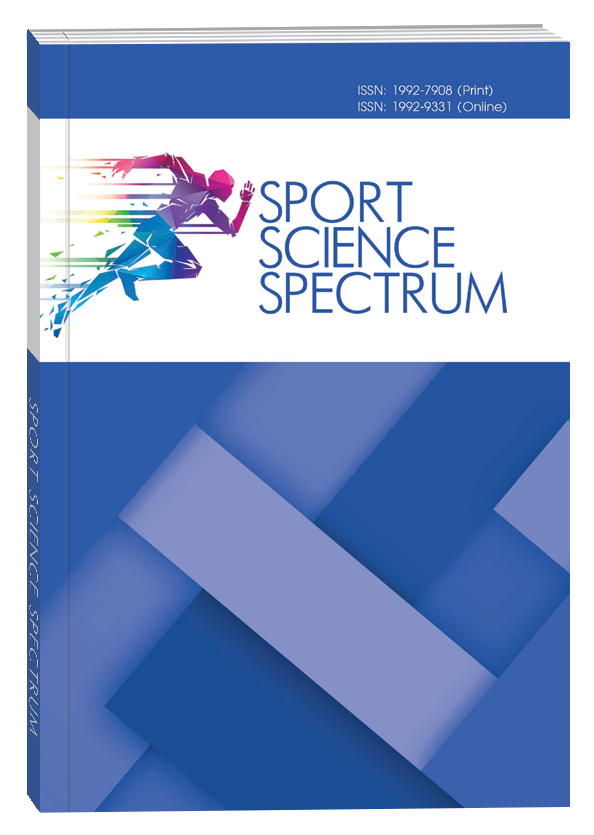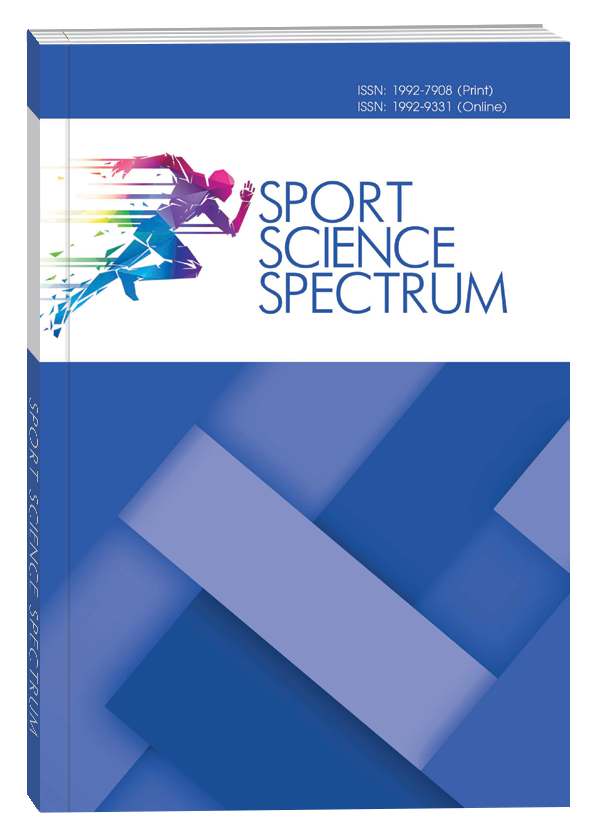THE EVOLUTION OF ATTITUDES TOWARDS PEOPLE WITH INTELLECTUAL DISABILITIES: FROM ISOLATION TO THE SPECIAL OLYMPICS
DOI:
https://doi.org/10.32782/spectrum/2024-4-3Keywords:
inclusion, stigmatization, social integration, people with disabilitiesAbstract
The article highlights the evolution of attitudes toward individuals with intellectual disabilities (ID), transitioning from isolation and stigmatization to the development of a modern inclusive model. The rationale for the study is based on the necessity of analyzing sociocultural and historical processes that influenced societal perceptions and determining the role of the Special Olympics in the social integration of individuals with ID. Particular attention is given to the relevance of inclusive programs that contribute to improving the quality of life for people with ID. The aim of the study is to examine the historical transformation of attitudes toward individuals with ID, identify key changes in approaches to their socialization, and analyze the contribution of the Special Olympics to building an inclusive environment. Methods of the study include literature review, historical and sociocultural analysis, and comparative methods. The sources utilized provided a comprehensive understanding of the evolution of perspectives on individuals with ID. Results of the study. Attitudes toward individuals with ID have varied across different historical periods, influenced by religious, social, and economic factors. In ancient societies, these individuals were often stigmatized and isolated, reinforcing negative stereotypes. During the Enlightenment, early scientific approaches to education and support for individuals with ID emerged. The 19th century was marked by the institutionalization of care, which simultaneously promoted segregation.The 20th century saw a shift toward inclusive approaches, notably through the development of the Special Olympics. Conclusions. From a theoretical point of view, the study contributes to a deeper understanding of the complex processes that shape social perceptions of disability.From a practical point of view, the results of the study can be used to develop more effective programmes and policies aimed at the inclusion of people with PWD. The article formulates specific recommendations for the further development of an inclusive society, including the need to overcome stereotypes, ensure equal access to education, employment and social services, and strengthen the role of NGOs in protecting the rights of people with intellectual disabilities.
References
1. Гончаренко Є., Когут І. Сталий розвиток Спеціальних Олімпіад: стратегічний план розвитку. Теорія і методика фізичного виховання і спорту. 2022. № 4. С. 59–64. URL: https://doi.org/10.32652/tmfvs.2021.4.59-64.
2. Гончаренко Є., Когут І. Формування міжнародної системи адаптивного спорту для людей з відхиленнями розумового розвитку. Теорія і методика фізичного виховання і спорту. 2022. № 3. С. 69–74. URL: https://doi.org/10.32652/tmfvs.2022.3.69-74.
3. Петронюк А., Стареправо М., Кропивницька Т. Еволюція суспільних поглядів на інвалідність в контексті європейського розвитку. Спорт та сучасне суспільство : матеріали XI Міжнародної наукової інтернет-конференції, 29 березня 2018 р. Київ : Олімпійська література, 2018. С. 249–253.
4. A history of disability: from 1050 to the present day. Historic England – Championing England’s heritage. Historic England. URL: https://historicengland.org.uk/research/inclusive-heritage/disability-history/.
5. Berkson G. Intellectual and physical disabilities in prehistory and early civilization. Mental retardation. 2004. Vol. 42. № 3. P. 195–208. URL: https://doi.org/10.1352/0047-6765(2004)42%3C195:iapdip%3E2.0.co;2.
6. Berkson G. Mental disabilities in western civilization from ancient rome to the prerogativa regis. Mental retardation. 2006. Vol. 44. № 1. P. 28–40. URL: https://doi.org/10.1352/0047-6765(2006)44[28:mdiwcf]2.0.co;2.
7. Bickenbach J., Rubinelli S., Stucki G. Being a person with disabilities or experiencing disability: two perspectives on the social response to disability. J Rehabil Med. 2017. № 49. P. 543–9. URL: https://doi:10.2340/16501977–2251.
8. Canadian Association for Supported Employment. Annual Report 2021–2022. URL: https://www.supportedemployment.ca.
9. Department for Education. Special Educational Needs in England. UK Government, 2022. URL: https://explore-education-statistics.service.gov.uk/find-statistics/special-educational-needs-in-england.
10. Gershon Berkson Intellectual and Physical Disabilities in Prehistory and Early Civilization. Mental Retardation. 2004. Vol. 42. № 3. P. 195–208. URL: https://doi.org/10.1352/0047-6765(2004)42%3C195:iapdip%3E2.0.co;2.
11. Hughes C., McDonald M.L. The Special Olympics: sporting or social event? Research and practice for persons with severe disabilities. 2008. Vol. 33. № 3. P. 143–145. URL: https://doi.org/10.2511/rpsd.33.3.143.
12. Inclusion International. Global Report on Inclusive Practices. 2022. URL: https://inclusion-international.org/global-report-2022.
13. Intellectual disability through the ages: a historical journey. NeuroLaunch.com. URL: https://neurolaunch.com/history-of-intellectual-disability/.
14. Intellectual disability: a conceptual history, 1200–1900 / C.F. Goodey et al. Manchester University Press, 2018. 272 p.
15. Irina Metzler Fools and Idiots? Intellectual Disability in the Middle Ages. Oxford : Manchester University Press, 2016. 352 p.
16. Michael L. Wehmeyer Self-Determination and the Education of Students with Disabilities. Cambridge : Cambridge University Press, 2007. 240 p.
17. National Strategy for Inclusive Education / Ministry of Education, Netherlands. 2022. URL: https://www.government.nl/topics/inclusive-education.
18. Munyi C.W. Past and present perceptions towards disability: a historical perspective. Disability studies quarterly. 2012. Vol. 32. № 2. URL: https://doi.org/10.18061/dsq.v32i2.3197.
19. Nenn K. Special Olympics’ roadmap to inclusion. Nonprofit communications report. 2024. Vol. 22. № 5. P. 6. URL: https://doi.org/10.1002/npcr.32390.
20. Past, present and future: perspectives on an oral history of intellectual disability nursing / C. Doyle et al. Journal of intellectual disabilities. 2022. P. 174462952110651. URL: https://doi.org/10.1177/17446295211065195.
21. Sakula A. Royal earlswood hospital: a historical sketch. Journal of the royal society of medicine. 1988. Vol. 81. № 2. P. 107–108. URL: https://doi.org/10.1177/014107688808100220.
22. Shriver T. Triumph from anguish: the inspiration of the Special Olympics. Journal of disability & religion. 2014. Vol. 18. № 1. P. 117–124. URL: https://doi.org/10.1080/15228967.2014.868990.
23. Special Olympics and UN refugee agency stand unified with refugees of all abilities. SpecialOlympics.org. URL: https://www.specialolympics.org/stories/news/special-olympics-and-un-refugee-agency-stand-unified-with-refugees-of-all-abilities.
24. Story of intellectual disability: an evolution of meaning, understanding, and public perception. Brookes Publishing, 2013. 304 p.
25. The Wild Boy of Aveyron / J. Itard ; trans. from French. New York : New York Review Books, 1996. 302 p.
26. United Nations. Convention on the Rights of Persons with Disabilities. New York : United Nations, 2006. URL: https://www.un.org/development/desa/disabilities/convention-on-the-rights-of-persons-with-disabilities.html.
27. United States Bureau of Labor Statistics. Persons with a Disability: Labor Force Characteristics Summary. 2023. URL: https://www.bls.gov/news.release/disabl.nr0.htm.
28. Zakaria N.N. Unveiling Hidden Histories: Disability in Ancient Egypt and Its Impact on Today’s Society – How Can Disability Representation in Museums Challenge Societal Prejudice? Soc. Sci. 2024. № 13 (12). P. 647. URL: https://doi.org/10.3390/socsci13120647.





